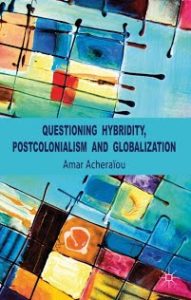 Questioning Hybridity, Postcolonialism and Globalization (Palgrave Macmillan, 2011) offers an accessible, in-depth analysis of hybridity as a practice, discourse, and ideological construction. Its scope ranges widely, encompassing conceptualizations of hybridity from ancient Greece and Rome to the present. The views of such key figures as Plato, Aristotle, Alexander the Great, Virgil, Gobineau, Renan, and Tocqueville, as well as Bakhtin, Fanon, and Bhabha are all freshly reassessed. The ground-breaking perspectives provided reorient contemporary debates on hybridity and the ‘Third Space’. They significantly widen our awareness of the history of métissage and expand the methodological, conceptual, empirical, and ideological orientations of contemporary hybridity theorists.
Questioning Hybridity, Postcolonialism and Globalization (Palgrave Macmillan, 2011) offers an accessible, in-depth analysis of hybridity as a practice, discourse, and ideological construction. Its scope ranges widely, encompassing conceptualizations of hybridity from ancient Greece and Rome to the present. The views of such key figures as Plato, Aristotle, Alexander the Great, Virgil, Gobineau, Renan, and Tocqueville, as well as Bakhtin, Fanon, and Bhabha are all freshly reassessed. The ground-breaking perspectives provided reorient contemporary debates on hybridity and the ‘Third Space’. They significantly widen our awareness of the history of métissage and expand the methodological, conceptual, empirical, and ideological orientations of contemporary hybridity theorists.
Acheraïou deftly examines the questions of race, class, identity, binarism, postmodernist ideology, neoliberalism, and globalization. In particular, he recommends decolonizing postcolonialism, indicating ways to transcend the cultural and spatial turn predetermining current discussions of métissage, culture, and identity politics. Throughout, he analyzes hybridity in the light of globalization, suggesting how postcolonialism could become a genuinely counter-hegemonic mode of resistance to global neoliberal doxa.
Amar Acheraïou, Questioning Hybridity, Postcolonialism and Globalization (Palgrave Macmillan, 2011)
